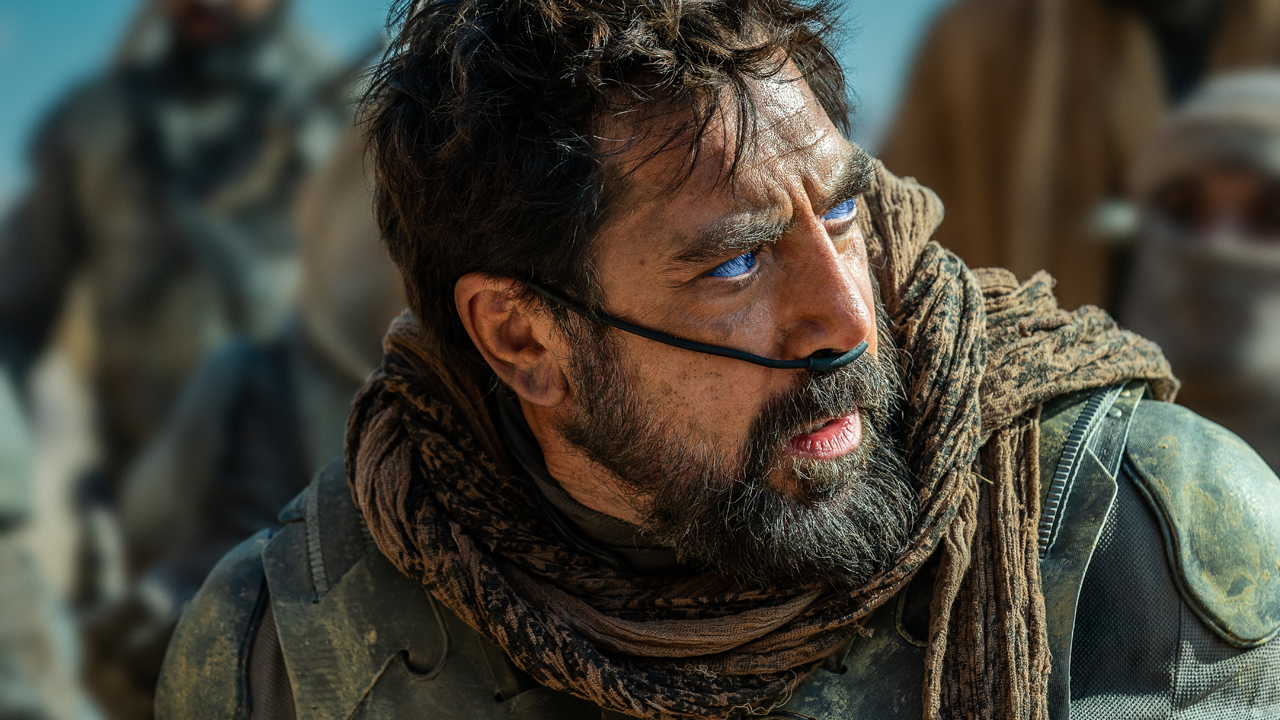My review of Denis Villeneuve’s Dune that was published in September 2021 was effusive, full of descriptions of cinematic wonder and gratitude for the blockbuster’s fealty to the source material, but my adulation came with a specification: the film alone doesn’t provide a complete narrative. An adaptation of half a book, it introduces multiple planets, establishes the key characters in the story, and instigates foundational conflicts, but it’s not built to provide any conclusions – leaving that duty for a sequel. The otherwise perfect movie required a companion follow-up feature that, as of its theatrical release, wasn’t guaranteed to be made.

Release Date: March 1, 2024
Directed By: Denis Villeneuve
Written By: Denis Villeneuve & Jon Spaihts
Starring: Timothée Chalamet, Rebecca Ferguson, Zendaya, Javier Bardem, Stellan Skarsgård, Austin Butler, Dave Bautista, Christopher Walken, and Florence Pugh
Rating: PG-13 for sequences of strong violence, some suggestive material and brief strong language
Runtime: 166 minutes
A little over two years later, Denis Villeneuve has brought his dream of Dune: Part Two to life, and it is every bit the film that fans have been both expecting and hoping for. It’s a breathtaking piece of blockbuster art that, like its predecessor, makes a dense sci-fi world magically tangible – only this time, there’s fulfillment of the heroes and villains’ arcs, and they satisfy in dramatic and devastating ways. To see it is to ride a sandworm, join a prayer around the hailed Lisan al-Gaib, and take vengeance against House Harkonnen and the corrupt intergalactic empire. It engulfs your mind in the spice melange; it’s a movie that you don’t just watch but experience.
Following the coordinated destruction of House Atreides that is orchestrated in Part One, Dune: Part Two picks up with Paul Atreides (Timothée Chalamet) and Lady Jessica (Rebecca Ferguson) as they attempt to assimilate into Fremen culture so that they may have any kind of chance surviving the harsh desert landscape of Arrakis. It is Paul’s hope to fight alongside the indigenous people of the planet as they take up arms against House Harkonnen – which has resumed its sadistic spice harvesting operations, but that initiative is disrupted by a sect of the Fremen. There are some, including the leader Stilgar (Javier Bardem), who believe that Paul is a prophesized messiah, and Lady Jessica not only doesn’t demur from the debate, but proselytizes the message when she becomes a Reverend Mother of the Bene Gesserit.
With his love Chani (Zendaya) by his side, Paul and the Fremen wage a guerilla war against Arrakis’ occupiers, earning the rage of the despot Baron Vladimir Harkonnen (Stellan Skarsgård) and his nephew, Glossu “Beast’ Rabban (Dave Bautista). But the fascistic Baron and Emperor Shaddam Corrino IV (Christopher Walken) have respectively dangerous allies on their side – namely the psychotic warrior Feyd-Rautha (Austin Butler) and brilliant young Bene Gesserit Princess Irulan (Florence Pugh). Further adding serious complication, Paul is plagued by horrific visions that tell him that his ascent to become the foretold Lisan al-Gaib will lead to the deaths of millions.
The second half of Frank Herbert’s Dune finally gets the big screen adaptation it deserves – with some smart changes made along the way.
This is the second time that this half of Frank Herbert’s Dune has made its way to the big screen… but on a certain level, that’s not totally true. While I count myself among the fans of David Lynch’s Dune film from 1984, anyone familiar with the novel will note that the back half of the story is critically underserved and rushed – lessening its impact. Denis Villenueve’s vision, in collaboration with co-writer Jon Spaihts, gives the material the real estate it needs, and it’s epic to behold.
With its 166-minute runtime, Dune: Part Two has the breadth to let audiences witness Paul and Lady Jessica respectively getting folded into Fremen society, peek into the political maneuverings being planned by the antagonists, and be awed by intense action as behemoth spice miners and Harkonnen soldiers are dismantled and dispatched by deadly and explosive ambushes. The film wows with spectacle, but provides everything with the weight that comes from understanding the perspectives of all the players and the personal consequences of their actions.
It’s noteworthy that this is partially achieved via deviations from the source material, but every choice made is logical and benefits the story – the standout narratively being the elimination of the book’s two-year time jump. An excellent creative direction is taken with the novel’s most unadaptable character (Paul’s hyper-intelligent toddler sister, Alia), and the film brilliantly captures a theological divide among the Fremen that is spearheaded by skeptical Chani and the zealous Stilgar. It all turns up the heat on the envisioned future that gives Paul nightmares and makes the shocking ending all the more powerful.
Your Daily Blend of Entertainment News
Passionate characters are brought to life by phenomenal performances…though fans shouldn’t get excited to see a lot of certain stars.
I should offer a warning for audiences: if you’re going into Dune: Part Two anticipating it as a “Florence Pugh” movie, you’re going to be as satisfied as Zendaya fans were going into the first film: it’s an important part that gets limited screen time, but she is set up for big things should Denis Villeneuve get his desired chance to make a film of Frank Herbert’s Dune Messiah. Pugh fans have nothing to be worried about based on what we see with Chani in this chapter, however, as Part Two is in many ways her story: we see Paul become accepted into the Fremen society through her eyes, and as she demonstrates her impressive skills fighting side-by-side with the man she grows to love, she is also the primary figure grounding him and holding him back from a death-filled future. Zendaya does tremendous work.
Austin Butler’s Feyd-Rautha is a savage, brutal force whose unpredictability makes one trepidatious about blinking (with a perfect voice to match Stellan Skarsgård’s Baron Harkonnen), and Rebecca Ferguson’s presence as the evolved, Machiavellian Lady Jessica is hypnotic – but the surprise standout of the cast is Javier Bardem. As Stilgar he accepts every sign of Paul’s messianic rise with a tear-filled fervor that is painfully earnest, as the passion that Bardem emotes and represents makes one understand the extreme danger in Paul’s ascendancy.
Dune: Part Two is one of the great big screen experiences of the 21st century.
All of Dune: Part Two’s dynamic action and drama plays out in a fictional world that feels real to the extent that one wonders how the production budgeted cast and crew transportation to another galaxy. Every scene and set piece is visually dazzling – from Jessica’s Reverent Mother transformation to Feyd-Rautha’s monochromatic gladiator battle – but it notably provides a big screen experience like few others in Paul’s first attempt to ride a sandworm. It stands alongside the Burj Khalifa climb in Mission: Impossible – Ghost Protocol, the sandstorm in Mad Max: Fury Road and “Avengers, assemble” in Avengers: Endgame as one of the great blockbuster moments of the young 21st century; it’s a breathtaking wonder that is not to be missed.
A disservice was done to Dune: Part One, as the film was given a day-and-date streaming launch alongside its theatrical premiere, and as such, there are members of the movie-going public who didn’t get to properly appreciate the majesty of the work. The jaw-dropping spectacle that is Dune: Part Two getting an exclusive big screen release is an opportunity to help mend that pop culture scar and gain a fuller understanding of the experience’s power. Had it come out on its original release date, it would have been crowned the best movie of 2023, but it will instead likely end up being remembered as the best movie of 2024.

Eric Eisenberg is the Assistant Managing Editor at CinemaBlend. After graduating Boston University and earning a bachelor’s degree in journalism, he took a part-time job as a staff writer for CinemaBlend, and after six months was offered the opportunity to move to Los Angeles and take on a newly created West Coast Editor position. Over a decade later, he's continuing to advance his interests and expertise. In addition to conducting filmmaker interviews and contributing to the news and feature content of the site, Eric also oversees the Movie Reviews section, writes the the weekend box office report (published Sundays), and is the site's resident Stephen King expert. He has two King-related columns.

